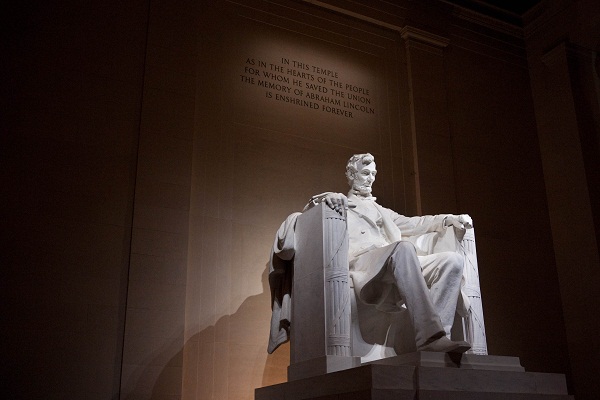Abraham Lincoln, in Walt Whitman’s celebrated phrase, contained multitudes. M.E. Synon showed yesterday quite how many there might have been. There is evidence of prejudice, callousness and corruption. Yet there is also the 13th amendment (1865): the basis, whatever the wider context of its adoption, of Lincoln’s right to be called the Great Emancipator.
Steven Spielberg’s Lincoln is a film of a book: Team of Rivals: The Political Genius of Abraham Lincoln by Doris Kearns Goodwin, a blockbuster that paints a little more of the good Lincoln than the bad, but which accepts Lincoln’s complexity freely by describing a determined politician at work. Daniel Day-Lewis’s often mesmerising, twinkling Lincoln is not wholly angelic. He promises, and then prevaricates. He charms, and then deceives. He schemes, bribes and threatens in pursuit of his cause. The film hints at Lincoln’s darker shades; but never goes further than showing him to be as devious as a moderately sized basket of snakes. Not bad for a politician.
Is Lincoln worse for this? As drama? Definitely not. It is compelling: a nineteenth century version of The West Wing. As history? Perhaps, depending on which interpretation(s) you read.
From this distance in time, and in view of the man’s legend and the civil rights struggle, we look at Lincoln through glass that is dark in places and rose-tinted in others. ‘Truth’ is elusive in such light.
It was ever thus. Take the massacre of the Dakota Sioux in 1862. Did Lincoln’s policy bow to the corporate interests which saw the United States stretch its western frontier? Or did the just president intercede to commute the death sentences for all except those 38 Sioux braves proved to have murdered settlers in Minnesota? The evidence supports both propositions.
Did Lincoln want to deport freed slaves to Africa? He seemed to, yet in the same breath he also said:
‘If as the friends of colonization hope, the present and coming generations of our countrymen shall by any means, succeed in freeing our land from the dangerous presence of slavery; and, at the same time, in restoring a captive people to their long-lost father-land, with bright prospects for the future; and this too, so gradually, that neither races nor individuals shall have suffered by the change, it will indeed be a glorious consummation.’
Who or what are ‘the friends of colonization’ and why do they hope to free the land of slavery? What does ‘dangerous presence of slavery’ mean? Is ‘restoring a captive people to their long-lost father-land’ meant literally or figuratively, and what does ‘gradually’ add to either context? Master politicians sculpt their words with care, and often use metaphor to obscure rather than explain. Lincoln’s tongue was surely no different.
Spielberg’s film touches on this calculated inscrutability when Thaddeus Stevens (the radical Republican) says to fellow Republicans, not all of whom are allies, that Lincoln is a maddening leader whose position shifts. Stevens et al return to these matters when assessing the 13th amendment, which in turn prompts them to ask if the war was being fought for reasons other than the emancipation of slaves?
Once again, the evidence supports various points of view, many of which concentrate on the extension of federal powers at the expense of the commonwealth of states. The prepositions in the famous phrase ‘government of the people, for the people and by the people’ express the logical strains in Lincoln’s contention that rights (and, therefore, presumably, all law) could only be guaranteed by a strong central government limited by itself, and that the ‘insurgents’, as Lincoln referred to secessionists throughout his second inaugural address (1865), were enemies of that same people. There is enough space between the eloquent words to justify the carnage of battle being repeated until the South submitted to Lincoln’s Union, and for Lincoln to pursue “legal” instruments and impure persuasion to win over the sceptical reaches of the North. Not without cause did the Gettysburg Address (1863) refer to ‘testing’ a ‘proposition’ of democracy; a sentiment that Spielberg emphasises with frequent use of the phrase ‘American experiment in democracy’.
Such grand experiments are rarely conducted by tidy people. The 19th century black politician Frederick Douglass’ gave, in 1876, an oration in memory of Lincoln. Douglass described Lincoln as ‘pre-eminently the white man’s president’ who ‘shared the prejudices common to his countrymen towards the colored race’. He reminded the audience of Lincoln’s weakness, blunders and suspect policies: he ‘refused to remove the popular commander of the Army of the Potomac, in the days of its inaction and defeat, who was more zealous in his efforts to protect slavery than to suppress rebellion.’ Nevertheless, Douglass said that ‘the hour and the man of our redemption had somehow met in the person of Abraham Lincoln’, whose ‘name and fame’ were ‘imperishable and immortal’. Douglass’s use of the word ‘somehow’ amid his ardent rhetoric is telling: Lincoln, despite all that he was (and all that we are and all that we’ve faced), somehow became the redeemer.
Douglass appears to have understood the multitudes that Lincoln contained and confronted, and those which endured the decade following the 13th amendment and Lincoln’s assassination. The oration marks the limitations of the age as well as its achievement. Through Douglass’s far-seeing eyes, Lincoln seems to arise as an imperfect but vital means to the noble end that ‘slavery… be utterly and forever abolished’. And he was the first. For this reason, Douglass crowned Lincoln ‘the first martyr President of the United States’.






Comments